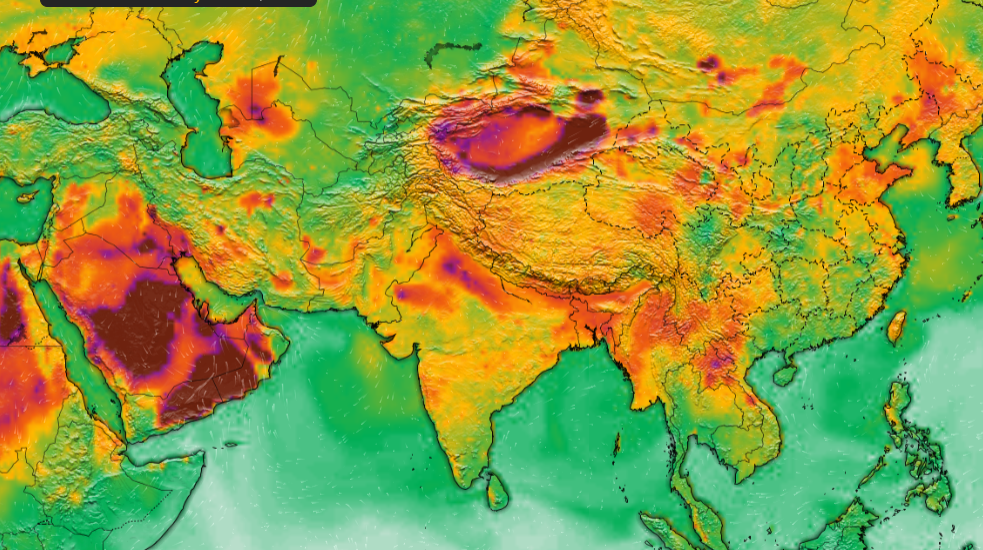"Disclaimer: While we strive to provide accurate information, please note that the content of this blog is based on available data and personal observations. Weather patterns can vary, and individual experiences may differ. We advise readers to consult official sources and exercise caution when interpreting weather-related information. Additionally, this blog does not claim to provide professional meteorological advice. Readers should rely on certified meteorologists and official weather forecasts for authoritative guidance."
 |
| source- msn.com |
Warning! Our country (India) is heating up.
Right now, India is hotter than Saudi Arabia, Oman, Sudan, Africa, and many
other countries. The heat wave is a national emergency for our nation. And the
summer season has just started. This year is going to be India’s hottest summer
season, but in this blog, we’ll not only discuss the threat but also the
solutions. Let’s start with the first concern:
 |
| source- Alamy stock photo |
 |
| Credit- PTI Copyright- Press Trust Of India |
 |
| Source- Drishti IAS |
2. What is a heat wave? Heat waves form when a high-pressure situation is created in the Earth’s atmosphere. Due to the high pressure in the upper atmosphere, winds get trapped towards the ground, and the heat that the ground reflects gets trapped in that area and cannot get out of that area. Winds can't come into this high-pressure area, and the heat also gets trapped. It's kind of like a pressure cooker. A heat wave is not a season like winter, summer, monsoon, rain, etc. A heat wave is a condition. A heat wave is declared only when the temperature goes above a particular limit, as per the IMD (Indian Meteorological Department). For plains, it is 5 degrees above the main temperature or crosses 40 degrees. In hilly areas, it is 5 degrees above the main temperature or crosses 35 degrees. In coastal areas, temperatures rise by 5 degrees above the mean or exceed 37 degrees. The economy is linked to people's productivity. It is connected to happiness, and people’s happiness is connected to the temperature. We have to think about how the changing environment is affecting our mood, productivity, and economy. All these things are connected. This is the truth. According to a study, the temperature of modern buildings is 5-7 degrees higher than in old areas. You must have seen such houses in many big cities where many people can’t afford a roof, so they put up a metal roof. 37% of Mumbai’s houses are like this. You can clearly see on Mumbai’s map that in Arey Forest, there is a very low temperature, and where the trees are less, the temperature increases. This is called the urban heat island effect. Now we talk about the solutions.
 |
| Source- Shutterstock Copyright- Design Rage |
3. If we have to beat the rising temperature in India, then we have to stop blindly copying Western ideas. We perfectly learn those things from the West, which we shouldn’t. For example, in New York, we saw that there were very tall glass buildings. This creates the thought in our minds that if we want to achieve corporate success, we should work for those companies. And thus, the same was copied and followed in India. Do you realize how stupid this is??
The average temperature in the summer in New York is 27 degrees Celsius, whereas in Mumbai it is 35 degrees Celsius. That means Mumbai is hot, humid, and tropical. And in winter, it snows in New York, but what difference is made if there are glass buildings in Mumbai? At the same time, two suns are formed. The glass buildings reflect the sunlight and create a double sun effect, which means double light and double heat. In cities like Mumbai, where there are only two seasons: summers and extreme summers, isn’t glass building a stupid idea? The people working in that glass building experience this phenomenon while traveling, yet they don’t even realize it. Because copying the Western has now become fashionable, who are we copying? A society that gives us stale food under the garb of “fast food" A society that wraps bananas in plastic so the fruit doesn’t spoil It would have been a great idea if bananas had a natural cover so that they always remained fresh. Those who respect nature so much that they cut down trees and make tissue papers of them and use it to clean their shite even though there is sufficient water and it is easily available. We have a lot to learn from the West and much more to unlearn. If we have to copy, then why can't we copy Singapore? Their climate is similar to ours, which also has space problems. In our gurukul system, children were taught to plant 1 peepal tree, 1 tamarind tree, 3 amla trees, and 5 mango trees. A mango tree produces 271 tons of oxygen in its entire lifetime and absorbs 81 tons of carbon. It’s the same amount of carbon that five ACs emit if they are used for 100 hours. If you are one of the 1% who agreed with this blog, please don’t forget to share it and also spread awareness about it.

It's terrible
ReplyDelete